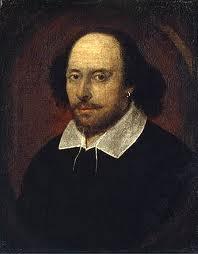God Lifts My Soul - Shakespeare's 29th Sonnet
Shakespeare's 29th Sonnet -
When, in disgrace with fortune and men's eyes,
I all alone beweep my outcast state
And trouble deaf heaven with my bootless cries
And look upon myself and curse my fate,
Wishing me like to one more rich in hope,
Featured like him, like him with friends possess'd,
Desiring this man's art and that man's scope,
With what I most enjoy contented least;
Yet in these thoughts myself almost despising,
Haply I think on thee, and then my state,
Like to the lark at break of day arising
From sullen earth, sings hymns at heaven's gate;
For thy sweet love remember'd such wealth brings
That then I scorn to change my state with kings.
William Shakespeare’s 29th sonnet is a wonderfully concise picture of a person who is mournful about their situation and then realizes, probably not for the first time, that there is great joy in the Lord. This was not what I expected when I first read the sonnet. I had never considered Shakespeare to be religious in any way. Not because I thought him to be anti-religious, but because no one I had heard talk about Shakespeare had ever characterized him as religious. Yet, when I read the sonnet a second and a third time, I became convinced this was not just a secularist who had written these words but someone for whom the precepts of Christianity were very real. When Christian values and personalities were included the process of analyzing the sonnet became much easier. Most amazingly was the realization that this seemed to be Shakespeare’s personal rendition of King David’s 13th Psalm.
Shakespeare starts the sonnet bemoaning his “outcast state” which may be an exaggeration to make the point he was going through some very trying times. Some think this sonnet was written around 1592 when Shakespeare was down on his luck financially and professionally. The theaters were closed due to a very bad outbreak of the Plague and he had been lambasted by a dying dramatist named Robert Greene who held some sway in London at the time (Mabillard). With death all around him and the financial woes caused by the lack of work, it is no wonder that in the fourth line of the sonnet Shakespeare would write “[I] look upon myself and curse my fate,” after his “bootless” (or useless) cries to Heaven, seemingly, go unanswered.
The sonnet is a rags to riches tale of the soul for there is no physical change to the individual at the end of the poem. Riches and wealth are used in the sonnet not meaning strictly money, but also intangible things such as the hope, art (skills) and scope (freedom) he sees others have. In the concluding couplet, though, it is someone’s love which brings to Shakespeare the treasure for which he would not trade his place for; not even with a king. Of the many reviews of this sonnet I have read, none say who this person is. Most allude to some woman Shakespeare pined after. None of them, however, speculated this person could be Jesus.
When one thinks about Shakespeare’s writing, it really should not be a surprise he would incorporate Christian values, ideals and personalities into his prose, poetry and playwriting. He grew up in Elizabethan England saturated with Christianity both at home and in school (Ryken). This was not the Christianity of Medieval Papal Rome; it was the Church of England where the Bible was allowed to be read in English (see endnote1).
Shakespeare was an Anglican not a Puritan and was not one to be overly preachy (Rowse 207) but he was involved in church all through his life and even became a “lay reader” of the Gospel in Stratford (Ryken). To not look at Shakespeare’s writing in a Christian context would be a mistake given his upbringing and the culture he lived in.
So where are the Christian elements in the sonnet? The first is in the overall theme of the poem which is even when a person is at their low point, the love that is existent in God raises you up. The Israelites with their back to the Red Sea and the Egyptian chariots bearing down on them saw this theme act out for them in real time when God, working through Moses, parted the waters for them to cross (Exodus 14:1-31). In the New Testament this theme is shown in, among other places, James 1:12 which states “Blessed is the man who perseveres under trial, because when he has stood the test, he will receive the crown of life God has promised to those who love Him.”
In line 4, Shakespeare takes a page out of the Book of Job when he says “And I look upon myself and curse my fate”. Job’s opening speech (Job 3) after he has suffered the loss of all his children and riches as well as terrible and painful bodily afflictions is about cursing the day of his birth and asking “Why is light given to those in misery and life to the bitter of soul” (Job 3:20)?
Shakespeare’s “bootless” cries are not heard because he is not asking for the kind of things which God will give to him. Shakespeare is coveting what other people have: friends, art (skills) and scope (freedom). While these things, in and of themselves are not bad, Shakespeare wants them for selfish reasons. This can be seen in the repetitiveness of “like him, like him” in the sixth line referring to this other person who has what Shakespeare does not. Jesus said “how much more will your Father in heaven give good gifts to those who ask him” (Matthew 7:11). But before you receive those good gifts, “seek first his kingdom and his righteousness, and all these things will be given to you as well” (Matthew 6:33). In the first part of the sonnet, Shakespeare is looking only at and for himself not to God.
Once Shakespeare gets to his bottom (“yet in these thoughts myself almost despising”) and turns his eyes upon the Lord (“Haply I think on thee”), then his state (or his soul) arises “Like to the lark at break of day arising”. This phrase is emphasized by Shakespeare since he uses both simile and alliteration at the same time. In using the lark, Shakespeare alludes to Jesus’ illustration of how we are “worth more than many sparrows” to God (Matthew 10:31). The reason for using a lark rather than a sparrow is the word lark allows for the alliteration previously mentioned and the size and color of a lark is similar enough to a sparrow for the allusion to work. These two lines also allude to the Parable of the Prodigal Son (Luke 15:10-32) particularly in verse 18 where the son says “I will arise and go to my father”. Once the prodigal acts on his decision, his father (God) runs out to meet him and welcomes him back to the family.
The last couplet speaks of “sweet love” which brings wealth – enough wealth so Shakespeare scorns any idea of changing his place with earthly kings. Jesus loves us so much he died for us while we were/are still sinners (Romans 5:8). With his death and resurrection we have the promised hope of eternal life with Him which is why Jesus speaks about storing treasure in heaven rather than on earth (Mathew 6:29-30). It is this heavenly wealth and sweet love the King of the Universe (Jesus) provides that allows Shakespeare to deride the idea he would ever change places with any earthly king despite all of their temporal riches and power. These concepts are the epicenter of Christianity and it is what the Bard would have grown up with and lived with his entire life.
The most amazing realization regarding this sonnet is it seems to be Shakespeare’s personal rendition of King David’s 13th Psalm. David wrote:
1 How long, O LORD? Will you forget me forever?
How long will you hide your face from me?
2 How long must I wrestle with my thoughts
and every day have sorrow in my heart?
How long will my enemy triumph over me?
3 Look on me and answer, O LORD my God.
Give light to my eyes, or I will sleep in death;
4 my enemy will say, “I have overcome him,”
and my foes will rejoice when I fall.
5 But I trust in your unfailing love;
my heart rejoices in your salvation.
6 I will sing to the LORD,
for he has been good to me.
David, like Shakespeare, cries out as he laments his situation. In David’s case he feels God has hid his face from him because his enemies are triumphing over him. It is only when David, again mimicked by Shakespeare, remembers to trust in the Lord his heart rejoices and he sings because the Lord has been good to him. David’s physical situation at the end of the Psalm is no different than it was at the beginning; it is his soul that is joyful even though his enemies are still out there. This is the same situation Shakespeare finds himself at the end of his sonnet. The fact both writers used nearly the same amount of words (110 words for David, translated, versus 114 words for Shakespeare) may be a coincidence but it adds to the appeal. What it does show is the themes of trial, tribulation, bemoaning one’s state, realizing the only place to look is to God and then having one’s soul rise up in joy over this realization are timeless.
When one looks at Shakespeare’s 29th Sonnet in light of Christian influences from his time and when one includes Biblical references, it makes the sonnet much easier to comprehend and appreciate. Jesus is the sweet love that raises the soul of Shakespeare just like He is the salvation which makes David’s heart joyful. This is not to say all of Shakespeare’s sonnets and other works have this much similarity with Christianity in general or the Book of Psalms in particular as a thorough examination of this concept is beyond the scope of this paper. However, the life of William Shakespeare and the culture he lived in makes one realize Christian values and precepts need to be taken into account when analyzing any of the Bard’s works.
Endnotes
1. The Bible Shakespeare most likely had available to him was the Bishop’s Bible. This Bible was first published in 1568 and was the official Bible for the Church of England until the publication of the King James Bible in 1611. Below is Psalm 13 as it appears in the original Bishop’s Bible without any modernization of spelling.
1 Howe long wylt thou forget me O God, for euer? howe long wilt thou hyde thy face from me? 2 Howe long shall I seke counsayle in my soule, and be so vexed in mine heart euery day? howe long shall myne enemie triumph ouer me? 3 Loke downe and heare me O God my Lorde: lighten myne eyes, lest that I sleepe in death. 4 Lest myne enemie say, I haue preuayled agaynst hym: lest they that trouble me reioyce yf I shoulde be remoued. 5 But I repose my trust in thy mercie, and my heart is ioyfull in thy saluation: 6 I wyll syng to God, because he hath rewarded me.
Copyright Statement: The Bishop's Bible (1568)
© 2002, StudyLight.org and Christian Library of Donetsk, Ukraine.
Bibliography
Craig, W. J. ed. The Histories and Poems of Shakespeare. London: Oxford University Press, 1912. Print.
Mabillard, Amanda. An Analysis of Shakespeare's Sonnet 29. Shakespeare Online. 2000. Web. 6 Mar 2012. http://www.shakespeare-online.com/sonnets/29detail.html
Rowse, A. L. “The Personality of Shakespeare”. Huntington Library Quarterly, Vol 27, No. 3 (May 1964): 193-209. Print.
Ryken, Leland. “Shakespeare as a Christian Writer.” Reformation21.org. June 2009. Web. 6 Mar 2012. http://www.reformation21.org/articles/shakespeare-as-a-christian-writer.php
Scripture taken from the HOLY BIBLE, NEW INTERNATIONAL VERSION®. Copyright © 1973, 1978, 1984 Biblica. Used by permission of Zondervan. All rights reserved.




Comments
Post a Comment